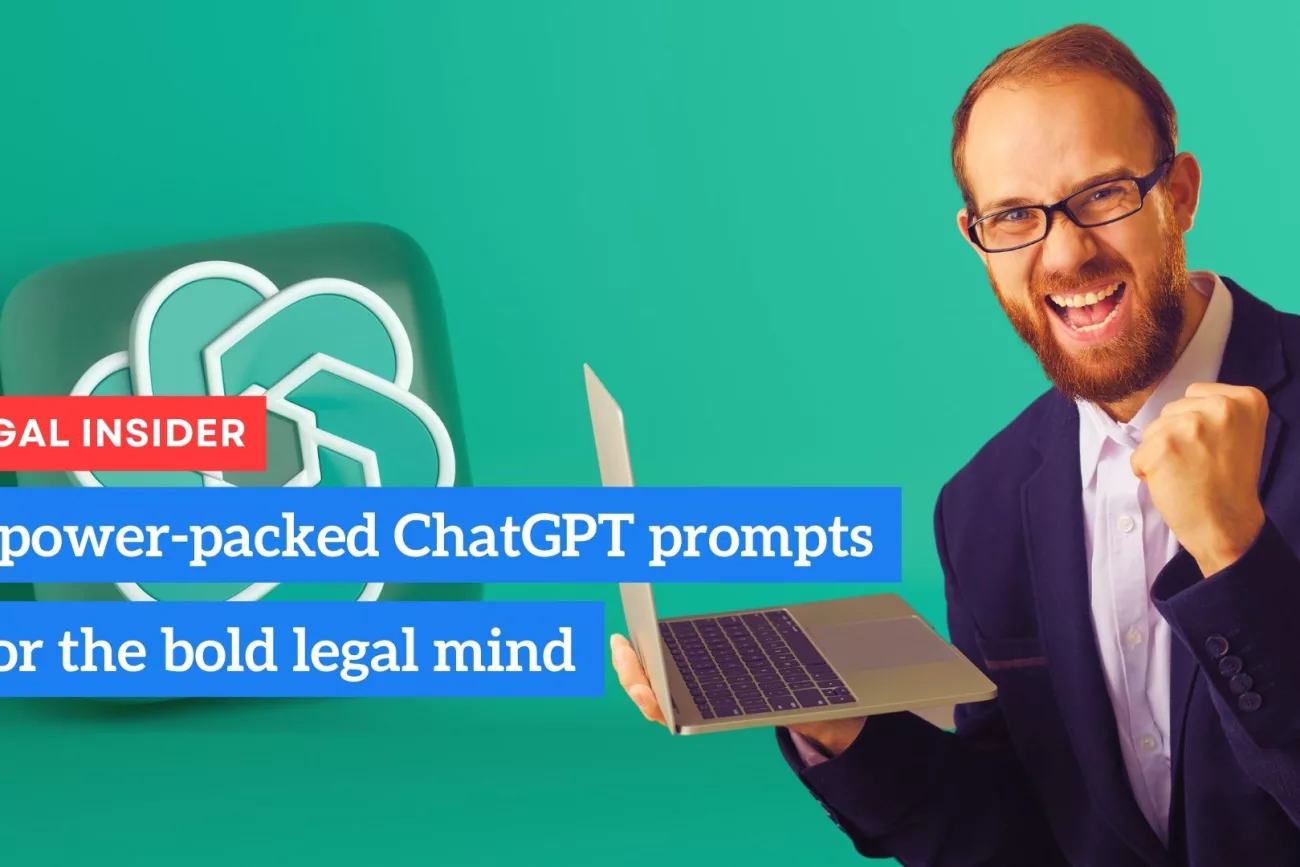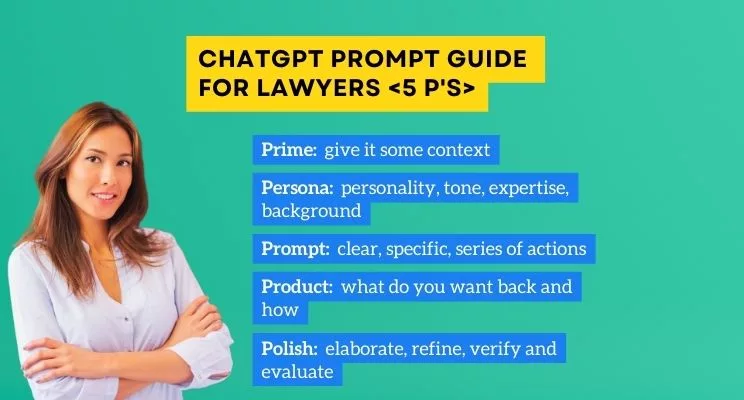
Key Points:
- The use of AI tools like ChatGPT in the legal industry is a hot-button topic, sparking debates about its implications, both positive and negative.
- ChatGPT can significantly enhance efficiency in legal work, from drafting documents to answering common legal questions. However, it comes with ethical considerations and limitations.
- Six practical ChatGPT prompts are outlined, illustrating the tool’s potential. It’s vital to use them responsibly and with discretion.
- Despite AI’s potential, it’s agreed that AI can never replace the empathy, critical thinking, and other soft skills unique to human legal professionals.
6 Game-Changing Legal Prompts: The Uncanny World of AI in Legal Work – ChatGPT 🚀
Just when you thought the world had reached peak technological disruption, along comes OpenAI’s ChatGPT. In the grand scheme of AI’s seismic shakedown, this chatbot has set tongues wagging, desks shaking, and minds bending in every sphere, not least the legal industry. 🏛️⚖️
It’s the magic genie in the lamp of natural language processing technology, granting your every wish with a mere prompt. Whether you’re looking for succinct answers to a legal question, crafting complex documents, cobbling together intricate lines of code, or seeking relationship advice (the jury’s still out on this one), ChatGPT has got you covered.
For the legally-minded, the prospect of this AI tool is not only fascinating but also fraught with implications. You’re not alone if you find yourself scratching your head, asking, “Just how far can I push this ChatGPT genie?” So, buckle up, legal eagles, as we deep dive into the murky waters of AI in law, explore the potentiality, and expose the tensions that lurk beneath the surface. 🌊👩⚖️🤔
The AI Invasion in Legal Territory – ChatGPT 👾⚖️
Before we unleash our provocative set of ChatGPT prompts tailored for the sharp legal mind, let’s pause and ponder the breathtaking scope of this AI tool’s offerings.
Envisage this: a world where law firms harness ChatGPT’s prowess for drafting persuasive marketing content or weaving intricate legal documents. The possibilities are dizzying and can dramatically tip the scales in favor of efficiency.
The Lawyer’s Arsenal: Leveraging ChatGPT’s Power 🧠🤖
With ChatGPT, a world of possibilities opens up:
- Streamline the process of researching and drafting legal documents.
- Distill complex legal jargon into understandable language for clients.
- Answer common legal queries and provide legal information at large.
- Automate mundane tasks like contract drafting or document review.
- Aid in conducting secondary research for cases.
The Catch: ChatGPT’s Constraints and Caveats ⚠️🚧
But, as the old adage goes, all that glitters is not gold. While ChatGPT boasts an impressive array of benefits, it’s not without its shortcomings and risks.
For starters, ChatGPT’s knowledge reservoir is stuck in the past, dating only up to 2021. For the freshest, most up-to-date information, you might have to rely on Google Bard—but even then, the onus is on you, the legal professionals, to cross-check the validity and reliability of the AI-generated content.
The unique blend of skills in your legal toolbox—critical thinking, professional expertise, and soft skills—remains irreplaceable.
And don’t forget the ethical minefield! How do you navigate client confidentiality when interacting with an AI tool like ChatGPT? And just how far can you go in outsourcing legal work to AI? These are questions that must make us pause and reflect. 😯💭🧐
Unleashing the Power: ChatGPT Prompts 101 💡🚀
Think of a prompt as a magic phrase you whisper to the ChatGPT genie, guiding it to conjure up the desired outcome. Given the AI’s expansive knowledge base, it will interpret the prompt and deliver a response promptly.
Picture this: you could command ChatGPT to draft a confidentiality agreement, and voila, it’ll serve up a professionally written agreement in a jiffy. You could also pair it with legal document automation tools, amplifying your firm’s productivity, while ensuring compliance and consistency. 📑🕓💫
However, remember to tread lightly when dealing with ChatGPT. We delve deeper into the ethics of AI in law in our other blog post.
Crafting a Masterful ChatGPT Prompt: The Art and the Science 🎨🧪
Want to get the best out of ChatGPT? Make your prompts as specific as possible. Here’s a handy guide:
Assign a role: Instruct ChatGPT to take a certain perspective. For example, “Act as my opposing counsel.”
Context is key: Feed as much information as you can and clearly define the desired outcome. For example, “Act as my opposing counsel and provide counterarguments to [legal case].”
Pepper with questions: Ask follow-up questions or rephrase questions to extract more information.
Cite your sources: Always ask for sources.
Polish your output: Always edit and validate the responses generated by ChatGPT. Never blindly copy and paste.
Josh Kubiki’s 5 Ps model for interacting with ChatGPT is a solid strategy to adopt.

6 Power-Packed ChatGPT Prompts for the Bold Legal Mind 💪⚖️🚀
Feeling overwhelmed? Fear not! Here are six starter prompts to help you get your feet wet. Remember, these are purely hypothetical and illustrative examples. Your mileage may vary, and caution must always be exercised when dealing with AI-generated content.
Legal Research and Analysis: “Conduct legal research on [legal issue or topic]. Please summarize relevant case law, statutes, regulations, and provide an analysis and conclusion.”
Legal Precedents: “Provide an overview of legal precedents in [area of law]. Include key cases, legal arguments, and potential implications of misinterpretation.”
Citation Check: “Review this [legal document type] for citation format and accuracy. Correct any errors found.”
Case Preparation: “Provide a list of all potential outcomes of [legal dispute] and advice on preparation.”
Statute and Regulation Definitions: “What are the governing statutes and regulations for [legal issue] in [jurisdiction]?” (Note: ChatGPT’s knowledge only goes to 2021. Always double-check with your own research.)
Legal Strategy: “What are the potential risks and benefits of pursuing [describe legal strategy]?”
Discovery Questions: “Generate a list of discovery questions for opposing parties in [specific legal issue]. Ensure questions are clear and concise.”
The Final Verdict on ChatGPT for Lawyers 🏛️⚖️💡
ChatGPT is an extraordinary tool that can revolutionize many facets of legal work. However, it’s crucial to remember that it isn’t an AI replacement for the unique human qualities legal professionals possess.
Keep the conversation going by signing up for our newsletter and join us on this thrilling ride through the ever-evolving landscape of AI in law. Together, let’s shape the future! 🚀🌠
References:
- OpenAI’s ChatGPT: What’s it all about? (OpenAI Official Blog)
- AI and Legal Industry: Pros and Cons (Harvard Law Review)
- Ethical considerations of AI in law (Stanford Law Journal)
- AI for Legal Research: Is it the Future? (Law Journal)
- The AI Revolution in Law: Boon or Bane? (The Legal Gazette)
Share this post
Frequently Asked Questions (FAQs)
Q: What is ChatGPT and how can it assist legal professionals?
A: ChatGPT is an AI developed by OpenAI, which can perform a range of tasks, from drafting legal documents to answering common legal questions. It can potentially enhance the efficiency of legal work.
Q: What are the ethical considerations of using ChatGPT in law?
A: ChatGPT should never be relied upon to replace human critical thinking and discretion. It’s also essential to respect client confidentiality and verify all information provided by AI.
Q: Can ChatGPT replace lawyers?
A: No. While AI can augment legal work, it can’t replace human qualities like empathy, critical thinking, and soft skills unique to being human.
Q: How can I ensure I'm using ChatGPT effectively?
A: Make your prompts as concrete as possible, providing context and desired outcomes. Always verify and edit the outputs, and never copy and paste directly.
Q: Is there a risk of inaccurate information from ChatGPT?
A: Yes, ChatGPT’s knowledge is only up to 2021, and the AI might not always provide accurate or up-to-date legal information.














